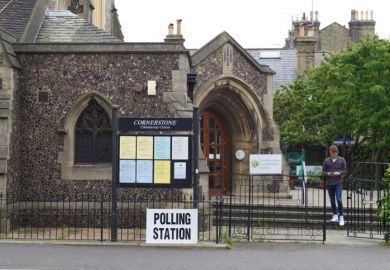Student accommodation has become a burning issue for universities across the UK as demand for higher education increases. With the end of the cap on undergraduate numbers in England taking effect in the 2015-16 academic year, a number of institutions are facing the prospect of a squeeze on available rooms.
Several universities have already experienced difficulties arising from sudden increases in student numbers this year, when an extra 30,000 places were made available in England alone.
In September 2014, dozens of first years at the University of Bristol – whose 2014 intake of UK and European Union students was 38 per cent higher than in 2011 – were forced to share rooms in halls of residence, in bunk beds.
Tom Phipps, the student living officer at the University of Bristol Students’ Union, said that the vast majority of the students now had their own room, but at the time it was “a severe worry to the students concerned; for many, this was their first time living away from home”.
“This problem of over-recruitment was not isolated to Bristol, but was found across the higher education sector,” he added.
Mr Phipps said that although Bristol was developing a plan of action to deal with future accommodation issues, the students’ union was increasingly worried about possible future expansion.
“More are being forced into private halls of residence, which have far higher rents,” he said.
“The private rented sector in Bristol is reaching saturation, and many houses are rented to students in such a poor condition that non-student tenants would refuse to live in them.”
Similar examples this year include the University of Winchester, where more than 100 students were left without places in city accommodation. Some were obliged to find places in Southampton, and others were put up in hotels in nearby towns.
Deputy vice-chancellor Neil Marriott attributed the problem to a “larger than expected” number of students holding insurance offers and to the institution’s commitment to offer accommodation to all first years. However, he said, a number of students who held offers and had reserved beds failed to enrol and the “situation was resolved within two weeks of the start of the academic year”.
Slow-building pressures
Although their institution was not subject to the changes in number controls in England, students at Aberystwyth University were also affected this year when new accommodation blocks were not completed on time.
Some undergraduates were denied their chosen accommodation, and many of those who had expected to move in by September 2014 began relocating to the new residences only in January. Aberystwyth said in a statement to students that the university had “not compromised on the quality [of accommodation] in order to ensure the quickest delivery date”.
The housing difficulties experienced by universities and students throughout the UK could well be exacerbated next year, and particularly in England with the lifting of the undergraduate cap. The issue is one that has an important bearing on student welfare and levels of student satisfaction.
According to the Higher Education Statistics Agency, there were more than 700,000 full-time first-year enrolments in the UK in 2013-14, a rise of 7 per cent on 2012-13. The Higher Education Policy Institute has predicted that there could be as many as 60,000 additional entrants each year in the wake of the abolition of student number controls.
In the long term, growing student demand has been regarded as an opportunity for universities and developers to improve and expand accommodation and facilities. Student property developments and spending on infrastructure and accommodation by both universities and private companies has been increasing.
According to research carried out last year by BiGGAR Economics, more than £9 billion was set to be spent by Russell Group universities between 2012-13 and 2016-17 on capital projects, with a large amount of this investment going towards new student facilities and halls of residence.
Some of the upcoming expansion projects are vast in scale. The University of Cambridge is currently in the early stages of its £1 billion North West Cambridge Development, which is expected to become home to up to 8,500 students, college staff and local residents.
Outside the Russell Group, the University of Sussex is undertaking more than £750 million worth of developments, including a £150 million plan for 1,400 new bedrooms at its East Slope location, and the university says that it plans to increase student numbers from 13,000 in 2014 to about 18,000 by 2018.
Cities lack purpose-built facilities
However, the major problem is the squeeze on accommodation in the short term before such new developments are completed.
In its Student Property Insight 2014 report last year, estate agents Knight Frank found that university cities were almost universally lacking in purpose-built student accommodation.
After this year’s problems, Bristol – upon the completion of 323 new rooms at its Hiatt Baker hall of residence at a cost of more than £20 million – stated that it remained fully committed to meeting an accommodation guarantee for first-year undergraduates.
“The university is now reviewing the properties that it runs in partnership with other accommodation providers to ensure that these are sufficient to meet student demand in 2015 and in future,” a Bristol spokeswoman said.
Professor Marriott said that in an attempt to ensure that Winchester’s problems were not repeated, the university was working on “systemic improvements such as more engagement with applicants throughout the admissions process”.
“The student housing team are creating better linkages with our online registration processes to enable us to contact applicants prior to arrival to establish whether they are intending on taking up an offer of a place at Winchester,” he said.
“We are also putting in place contingency plans to deal with any unexpected short-term accommodation pressures so that all new students can be accommodated within a reasonable distance of the university.”
However, the National Union of Students’ vice-president for welfare, Colum McGuire, said that despite the action taken by universities after various housing crises, there continued to be problems every year with institutions resorting to putting students in hostels, hotels and camp beds, and even leaving some at risk of homelessness.
Mr McGuire said that the best way forward was for universities to be “open and transparent about what they can offer, and what they’ll do to support students”.
He added: “Historically, universities’ failure to plan strategically for the accommodation needs of their students has led to local housing shortages and to a sense of mistrust between students and the wider community.
“It simply isn’t good enough for universities to cash in on expanded student numbers without proper concern for these students’ welfare.”
Register to continue
Why register?
- Registration is free and only takes a moment
- Once registered, you can read 3 articles a month
- Sign up for our newsletter
Subscribe
Or subscribe for unlimited access to:
- Unlimited access to news, views, insights & reviews
- Digital editions
- Digital access to THE’s university and college rankings analysis
Already registered or a current subscriber? Login





